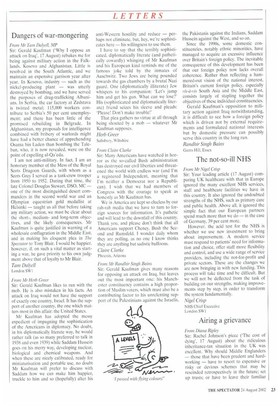Dangers of war-mongering
From Mr Tam Dalyell, MP Sir: Gerald Kaufman ('Why I oppose an attack on Iraq', 17 August) rebukes me for being against military action in the Falklands, Kosovo and Afghanistan. Little is resolved in the South Atlantic, and we maintain an expensive garrison year after year. In Kosovo, industry — such as the nickel-producing plant — was utterly destroyed by bombing, and we have served the purposes of drug-trafficking Albanians. In Serbia, the car factory at Zedstava is twisted metal: 115,000 workers contribute to Serbia's 50 per cent unemployment: and there has been little of the promised rebuilding in Belgrade. In Afghanistan, my proposals for intelligence combined with bribery of warlords might have had a better chance of apprehending Osama bin Laden than bombing the Taleban, who, it is now revealed, were on the point of expelling al-Qa'eda.
I am not anti-military. In fact, I am an honorary member of the Mess of the Royal Scots Dragoon Guards, with whom as a Scots Grey I served as a tank-crew trooper from 1950 to 1952. During that time, the late Colonel Douglas Stewart, DSO, MC — one of the most distinguished desert commanders in the second world war and an Olympian equestrian gold medallist at Helsinki — taught us all that before taking any military action, we must be clear about the short-, mediumand long-term objectives, and the likely consequences. Mr Kaufman is quite justified in warning of a wholesale conflagration in the Middle East, and in making his eloquent plea in The Spectator to Tony Blair. I would be happier, however, if, on such a vital matter as starting a war, he gave priority to his own judgment above that of loyalty to Mr Blair.
Tarn Da/yell
London SW I
From Mr Herb Greer Sir: Gerald Kaufman likes to run with the mob. He is also mistaken in his facts. An attack on Iraq would not have the support of exactly one country, Israel. It has the support of another country, the one which matters most in this affair: the United States.
Mr Kaufman has adopted the messy expedient of impugning the sophistication of the Americans in diplomacy. No doubt, in his diplomatically literate way, he would rather talk (as so many preferred to talk in 1938 and even 1939) while Saddam Hussein goes on his merry way, developing nuclear, biological and chemical weapons. And when these are nicely calibrated, ready for miniaturisation and portable use, no doubt Mr Kaufman will prefer to discuss with Saddam how we can make him happier, truckle to him and so (hopefully) alter his anti-Western hostility and reduce — perhaps not eliminate, but, hey, we're sophisticates here — his willingness to use them.
I have to say that the terribly sophisticated, diplomatically literate (and pathetically cowardly) whinging of Mr Kaufman and his European kind reminds me of the famous joke told by the inmates of Auschwitz. Two Jews are being pounded towards the gas chambers by a brutal Nazi guard. One (diplomatically illiterate) Jew whispers to his companion: 'Let's jump him and get his gun. What can we lose?' His (sophisticated and diplomatically literate) friend seizes his sleeve and pleads: 'Please! Don't make trouble!'
That plea gathers no virtue at all through being shouted by a mob — whatever Mr Kaufman supposes.
Herb Greer
Salisbury, Wiltshire
From Claire Clarke Sir: Many Americans have watched in horror as the so-called Bush administration has destroyed our civil liberties and threatened the world with endless war (and I'm a registered Independent, meaning that I'm neither a Democrat nor a Republican). I wish that we had members of Congress with the courage to speak as honestly as Mr Kaufman has.
We in America are kept so clueless by our rah-rah media that we have to turn to foreign sources for information. It's pathetic and will lead to the downfall of this country. Thank you, and please don't think that all Americans support Cheney, Bush the Second and Rumsfeld. I wonder daily whom they are polling, as no one I know thinks they are anything but sadistic buffoons.
Claire Clarke
Phoenix, Arizona
From Mr Randhir Singh Bains Sir: Gerald Kaufman gives many reasons for opposing an attack on Iraq, but leaves out the most important one: his Manchester constituency contains a high proportion of Muslim voters, which must also be a contributing factor to his unrelenting support of the Palestinians against the Israelis, the Pakistanis against the Indians, Saddam Hussein against the West, and so on.
Since the 1990s, some domestic constituencies, notably ethnic minorities, have managed to acquire an excessive influence over Britain's foreign policy. The inevitable consequence of this development has been that our foreign policy now lacks overall coherence. Rather than reflecting a hammered-out vision of the national interest, Britain's current foreign policy, especially vis-a-vis South Asia and the Middle East, consists largely of stapling together the objectives of these individual constituencies.
Gerald Kaufman's opposition to military action against Iraq notwithstanding, it is difficult to see how a foreign policy which is driven not by external requirements and formulated national interests but by domestic pressure can possibly serve this country in the long run.
Randhir Singh Bains
Gants Hill, Essex






























































 Previous page
Previous page